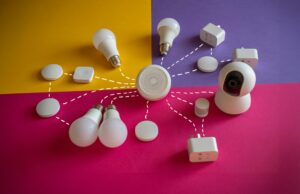
Let’s talk about something that’s been buzzing in the realm of home innovation: smart homes. You’ve probably heard about them—those futuristic dwellings where everything from your thermostat to your toaster can be controlled with a swipe of your smartphone. But are smart homes really all they’re cracked up to be? Are they truly making our lives easier, or are they just another tech gimmick? Let’s dive in and find out!
The Promise of Convenience
One of the biggest selling points of smart homes is their promise of convenience. Imagine being able to adjust the temperature, dim the lights, and lock the doors—all without getting off the couch. It’s the stuff of lazy-day dreams, right? With smart home technology, mundane tasks are automated, giving us more time to focus on the things that truly matter.
Take, for example, smart thermostats like Nest or Ecobee. Not only do they learn your heating and cooling preferences over time, but they also adjust automatically to optimize energy efficiency. No more fiddling with the thermostat or coming home to a chilly house—your smart home has it covered.
Enhanced Security and Peace of Mind
Another major benefit of smart homes is the added layer of security they provide. With smart locks, cameras, and motion sensors, you can keep an eye on your home from anywhere in the world. Receive instant alerts on your phone if there’s unexpected activity or if someone tries to tamper with your property.
But it’s not just about keeping the bad guys out—smart homes also help us feel safer and more connected to our loved ones. Whether you’re checking in on elderly parents, monitoring your pets, or simply making sure the kids got home from school safely, smart home technology offers peace of mind like never before.
Energy Efficiency and Sustainability
In an age of increasing environmental awareness, smart homes are paving the way for a more sustainable future. By optimizing energy usage and reducing waste, they help lower utility bills and minimize our carbon footprint. Smart lighting, for example, can be programmed to turn off automatically when not in use, while smart appliances can adjust their power consumption based on demand.
But it’s not just about saving money—it’s about doing our part to protect the planet for future generations. With smart home technology, we can make small changes that add up to big impacts, all while enjoying the comforts of modern living.
The Learning Curve
Of course, no technology is without its challenges, and smart homes are no exception. For many homeowners, the learning curve can be steep, especially for those who aren’t tech-savvy. Setting up and configuring smart devices can be daunting, and troubleshooting technical issues can quickly become frustrating.
Then there’s the issue of compatibility—making sure that all your smart devices play nice with each other and with your existing home infrastructure. Not all devices are created equal, and navigating the tangled web of protocols and standards can be enough to make your head spin.
Privacy Concerns
Last but not least, let’s talk about the elephant in the room: privacy. With the rise of interconnected devices and the internet of things (IoT), concerns about data privacy and security have become more prominent than ever. Every smart device we add to our homes is another potential entry point for hackers and data breaches.
From smart speakers listening in on our conversations to cameras capturing our every move, the amount of personal data being collected and transmitted by smart home devices is staggering. And while manufacturers claim to take privacy seriously, the reality is that our data is often bought, sold, and shared without our knowledge or consent.
Finding Balance in the Smart Home Era
So, where does that leave us? Are smart homes truly making our lives easier, or are they just another source of stress and anxiety? The answer, as with most things in life, lies somewhere in the middle.
Smart homes undoubtedly offer a wealth of benefits, from convenience and security to energy efficiency and sustainability. But they also come with their fair share of challenges, from the learning curve and compatibility issues to privacy concerns and data security risks.
As we continue to embrace smart home technology, it’s important to strike a balance between convenience and caution. Educate yourself about the risks and take proactive steps to protect your privacy and security. Invest in reputable brands and products with strong encryption and data protection measures.
Ultimately, the decision to adopt smart home technology is a personal one, and what works for one person may not work for another. So, whether you’re all in on the smart home revolution or prefer to keep things old school, remember that the most important thing is to create a home that feels safe, comfortable, and welcoming—a place where you can truly be yourself, smart devices and all.
